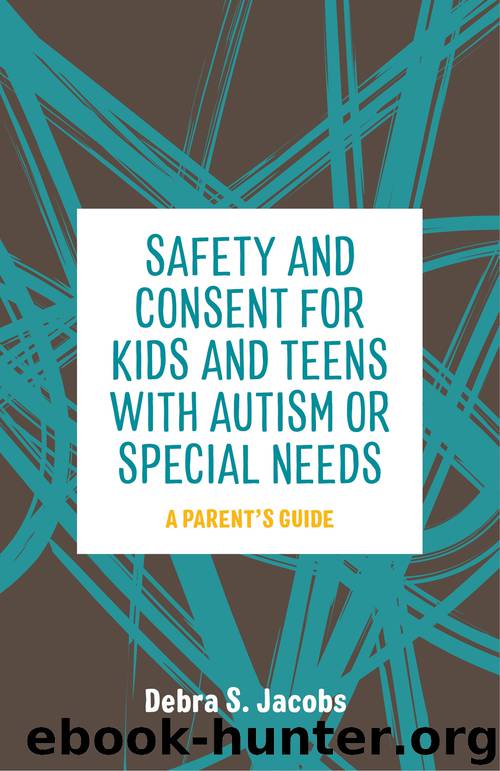Safety and Consent for Kids and Teens with Autism or Special Needs by Debra Jacobs

Author:Debra Jacobs
Language: eng
Format: epub
ISBN: 9781784509705
Publisher: Jessica Kingsley Publishers
Published: 2018-10-01T16:00:00+00:00
Expected behavior in public
Everyone’s behavior adjusts depending on the setting and circumstance. Home is the place where we can be most intimate and relaxed; public places in general call for more formal and restrained conduct. While singing loudly may be acceptable and even encouraged at home, this artistic expression may not be looked on favorably in the library, on the city bus, or in your favorite lunch spot. Without realizing it, we are continually teaching our children appropriate behavior. Thinking about teaching our children how others should act, especially towards them, is an important prevention tool.
In public we must teach our children to be vigilant. Of course not everyone or every place is a danger, but children with special needs, more than typically developing children, do not have discernment skills. This is an area where you teach your child in absolute—there is no gray area here.
• If someone you do not know offers your child something to eat, usually a treat, she is to say “No thank you.” This may include samples handed out at a store. If your child is non-verbal, she is to sign or otherwise communicate a negative response. If there is a food that you decide is acceptable for your child to eat, have the sales person hand you the food and you can choose to have your child enjoy it or not. The child with special needs should learn that she is not to accept food from anyone unless you approve it; she is not to decide for herself.
• A child will never be in a position to help an adult, especially a stranger. Children may be asked to help an adult find a lost puppy or some other apparently innocent request. Of course the child not only wants to be helpful, but would also look forward to playing with a puppy once it was found. Teach your child that she is never to go anyplace with another person that you do not know, have not introduced her to, or explained to her the reason she may need to go with that adult or older child.
• Touch is a very personal and intimate act. Many children with an ASD have tactile defensiveness, that is, they are sensitive to touch and have specific feelings about the kind of touch, light or firm, and where on their body they will tolerate touch. This is an excellent defense mechanism, but not all children have it. Simply shrugging off the touch of another and moving close to you is an excellent way for your child to avoid unwanted touch. Teach your child that the touch of a stranger is not acceptable. Explain to the stranger so that your child can hear that you do not want him to touch your child. Then move away from that person.
It is never appropriate for touching of private parts in public. As you walk through public spaces with your child, show her how people are keeping their hands to themselves. They are holding their bags or coffee cups.
Download
This site does not store any files on its server. We only index and link to content provided by other sites. Please contact the content providers to delete copyright contents if any and email us, we'll remove relevant links or contents immediately.
I Capture the Castle by Dodie Smith(2034)
The Heavy by Dara-Lynn Weiss(1806)
Aspergirls by Rudy Simone(1696)
Be Different by John Elder Robison(1646)
Autism's False Prophets by Paul A. Offit(1535)
My Child's Different by Elaine Halligan(1513)
Smart but Scattered—and Stalled by Richard Guare(1498)
101 Tips for the Parents of Boys with Autism by Ken Siri(1483)
Asperger Syndrome (Autism Spectrum Disorder) and Long-Term Relationships by Ashley Stanford(1424)
What's Making Our Children Sick? by Michelle Perro(1415)
ADHD by Mark Selikowitz(1391)
Girlish by Lara Lillibridge(1385)
On Immunity: An Inoculation by Biss Eula(1358)
Nerdy, Shy, and Socially Inappropriate by Cynthia Kim(1347)
An Adult with an Autism Diagnosis by Gillan Drew(1344)
Animal-assisted Interventions for Individuals with Autism by Temple Grandin(1328)
Sarah's Child (Hqn Romance) by Linda Howard(1311)
The Cities by K.A Knight(1306)
Seeing Ezra by Kerry Cohen(1304)
